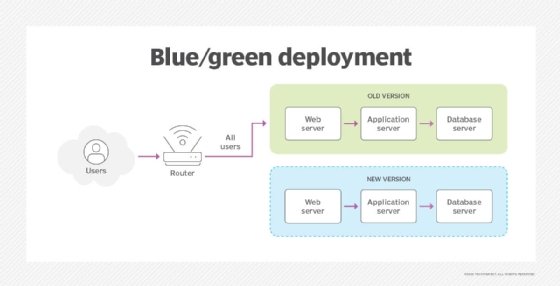What is blue/green deployment?
Blue/green deployment is a change management strategy for releasing software code. Also known as A/B deployment, it uses two identical hardware environments -- one active (blue) and one idle (green) -- to support safe, low-disruption releases.
Blue/green deployments are often used for consumer-facing applications and applications requiring high availability.
How a blue/green deployment works
When a new application version is ready, the engineering team deploys it to the idle environment and thoroughly tests it. Once the team verifies that the new version works as expected, it switches user traffic to the updated environment, typically by adjusting a router configuration to redirect application program traffic. When the next software iteration is ready, the team reverses the process, deploying it to the now-idle environment.
If problems emerge after switching to the new environment, the team can quickly roll back by redirecting traffic to the previous environment, which still runs the original version. After the new version proves stable in production, the team can update the inactive environment and keep it ready as a disaster recovery backup.

Benefits, drawbacks and alternatives
The main advantage of blue/green deployment is the ability to perform fast rollbacks and reduce downtime during updates. While effective, blue/green deployment requires maintaining two identical sets of infrastructure, which can increase costs and overhead without improving capacity or utilization.
Organizations with tighter budgets might opt for alternative strategies, such as canary testing or rolling deployments. A canary test releases new code to a small group of users to test for issues, while a rolling deployment staggers the rollout of new code across servers.







